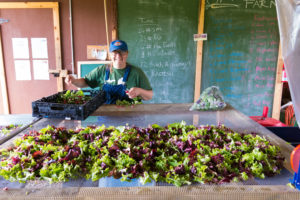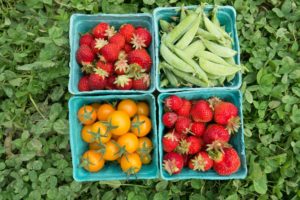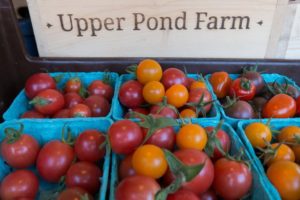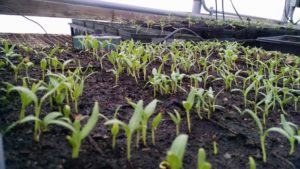
Baylee believes in marketing her crops locally through farmers markets and her CSA.
Farmer Grows to Feed Her Community
By Cassie Bable, FSA Public Affairs Specialist
This week, USDA celebrates National Farmers Market Week with farmers, like Baylee Drown, who supply fresh fruits and vegetables to their communities. Farmers markets give consumers access to locally-grown and farm-fresh products, while giving farmers the platform to grow and connect with their customer base.
Farm Kid to Farmer
Baylee grew up on a conventional dairy farm in Michigan. Like many farm kids, she participated in 4-H and FFA. In college, she followed her passion for agriculture by pursuing an animal science degree.
But a college class changed her perspective on agriculture and piqued her interest in growing vegetables.
Her first job out of college was working on a diversified organic farm in Vermont. The operation produced livestock and vegetables. This is where Baylee was exposed to small-scale organic and sustainable practices and fell in love with direct marketing and growing vegetables.
Fresh from the Market
Baylee has been in business on her own for five years in southeast Connecticut. She started her own agriculture operation, Upper Pond Farm, growing a variety of vegetables and fruits including ginger, tomatoes, salad mixes, head lettuce, microgreens, dry beans, strawberries, raspberries, melons, herbs and a few edible flowers.


Baylee believes in marketing her crops locally. Customers can purchase her produce from farmers markets, her Community Supported Agriculture (CSA) program and can even find her produce at the supermarket and at local restaurants.
“Farmers markets are a great way to get to know your community, and make life-long customers and friends,” said Baylee. “Also, they are flexible, so they are a great way to get your feet wet when you first start farming. We also get our best price at market.”
Her crops are sold at several farmers markets and she sets up shop in front of a customer’s business one day a week. This winter, she will also participate in the Greenwich Winter Farmers Market. Her most popular year-round item is baby salad mix, and the seasonal favorites are strawberries, cherry tomatoes, peas, ginger, carrots, beets and winter spinach.
“We really believe in feeding our neighbors,” said Baylee. “Everyone should have access to wholesome, healthy food.”
The rest of Baylee’s harvest is sold through her CSA. Baylee supplies 100 families with fresh fruits and vegetables 36 weeks out of the year.
Working with USDA
Farmers and ranchers, like Baylee, who work hard each year to bring a crop to market constantly face circumstances out of their control, such as markets and weather.
Baylee uses USDA assistance to support and protect her operation. She uses the Farm Service Agency’s (FSA) Noninsured Crop Disaster Assistance Program (NAP) to protect the operation from natural disasters that can destroy crops or lower yields.

College changed Baylee’s perspective on agriculture and piqued her interest in growing vegetables.
Baylee also serves as a voice for local farmers in her community by serving on the New London FSA County Committee. She is serving in an appointed position and brings a unique perspective as the only vegetable farmer on the committee.
She is a firm believer in conserving the soil and uses the Environmental Quality Incentives Program (EQIP) through the Natural Resources Conservation Service (NRCS). EQIP provides agricultural producers with financial resources and one-on-one help to plan and implement improvements using conservation practices.
Baylee monitors soil compaction, grows cover crops and takes measures to prevent soil erosion.
More Information
Join the National Farmers Market Week celebration by supporting your community and local farmers and ranchers. Use the USDA National Farmers Market Directory to find a market near you. To date, there are more than 8,700 markets in the USDA Farmers Market Directory.
USDA offers a variety of risk management, disaster, loan and conservation programs to help agricultural producers in the United States weather ups and downs in the market and natural disasters as well as invest in improvements to their operations. Learn about additional programs.
For more information about USDA programs and services, contact your local USDA service center.
JOIN THE CONVERSATION
For the digital version of this blog, visit #FridaysOnTheFarm.
Follow the #FridaysOnTheFarm story series and other news you can use on farmers.gov and @Farmersgov Twitter.





